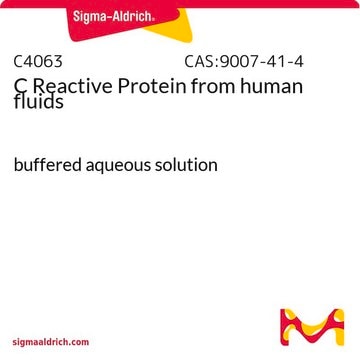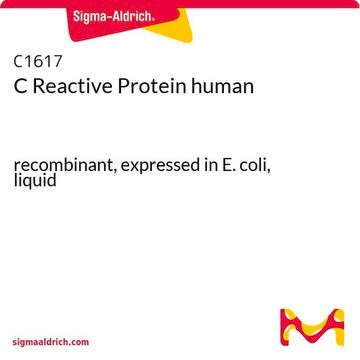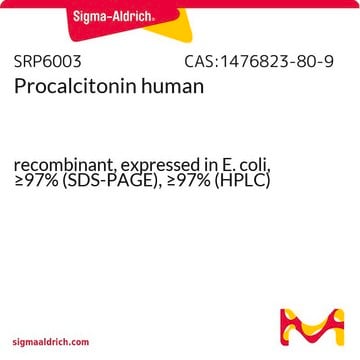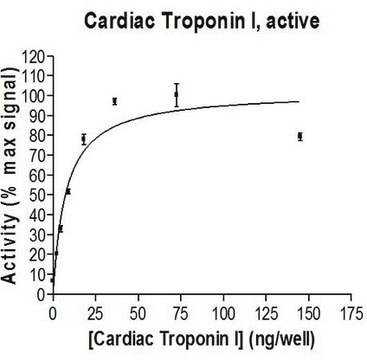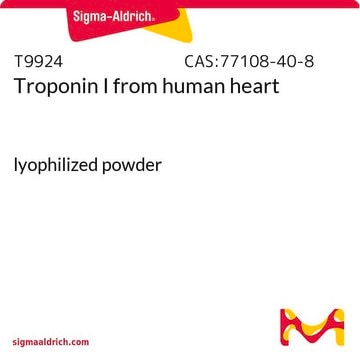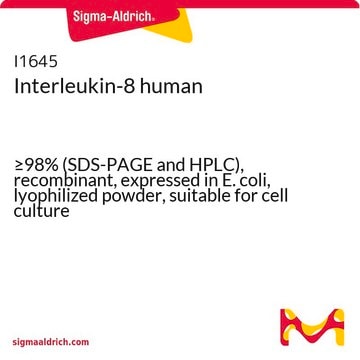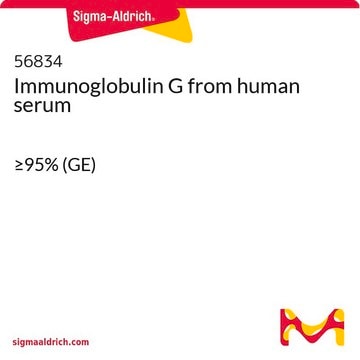AG723-M
C-Reactive Protein
Synonym(e):
CRP
Anmeldenzur Ansicht organisationsspezifischer und vertraglich vereinbarter Preise
Alle Fotos(1)
About This Item
UNSPSC-Code:
12352202
eCl@ss:
32160405
NACRES:
NA.41
Empfohlene Produkte
Biologische Quelle
human
Qualitätsniveau
100
300
Assay
>98% (SDS-PAGE)
Form
liquid
Hersteller/Markenname
Chemicon®
Konzentration
3.5 mg/mL
NCBI-Hinterlegungsnummer
UniProt-Hinterlegungsnummer
Allgemeine Beschreibung
C-reactive protein (CRP) is a homopentameric acute-phase inflammatory protein, which belongs to the pentraxin family. It is a highly conserved plasma protein produced mainly in liver hepatocytes. It is also synthesized by lymphocytes, smooth muscle cells, macrophages, endothelial cells, and adipocytes.
Anwendung
C-reactive protein (CRP) has been used:
- as a model analyte for interference-reduced detection of CRP in serum using non-competitive sandwich immunoassay in combination with surface plasmon field-enhanced fluorescence spectroscopy (SPFS)
- to determine the involvement of collectin placenta 1 (CL-P1) in CRP-mediated complement activation and to investigate the downstream effects of this complement activation
- to examine to study the effects of lectin-like oxidized low-density lipoprotein receptor 1 (LOX-1) on CRP-induced complement activation by interacting with CRP to develop an inflammatory pathogenic response
Biochem./physiol. Wirkung
C-reactive protein (CRP) plays a vital role in the complement pathway, apoptosis, phagocytosis, nitric oxide (NO) release. It also regulates the production of interleukin-6 and tumor necrosis factor-α. Patients suffering from appendicitis, cholecystitis, pancreatitis, and meningitis have elevated levels of CRP. CRP facilitates the uptake of low-density lipoprotein in macrophages. It has a crucial role in the pathophysiology of cardiovascular disease, which makes it a useful marker for inflammation and cardiovascular events.
Qualität
No precipitin bands when tested at 2 mg/mL against anti-whole human serum.
Physikalische Form
Liquid in 100mM NaCl, 10mM Tris-HCl with 0.1% sodium azide, 2mM CaCl2
Lagerung und Haltbarkeit
Maintain under sterile conditions at 2-8°C for up to one year. Do not freeze. Full safety precautions should be taken as in the handling of any potentially infective body fluid.
Rechtliche Hinweise
CHEMICON is a registered trademark of Merck KGaA, Darmstadt, Germany
Lagerklassenschlüssel
12 - Non Combustible Liquids
WGK
nwg
Flammpunkt (°F)
Not applicable
Flammpunkt (°C)
Not applicable
Analysenzertifikate (COA)
Suchen Sie nach Analysenzertifikate (COA), indem Sie die Lot-/Chargennummer des Produkts eingeben. Lot- und Chargennummern sind auf dem Produktetikett hinter den Wörtern ‘Lot’ oder ‘Batch’ (Lot oder Charge) zu finden.
Besitzen Sie dieses Produkt bereits?
In der Dokumentenbibliothek finden Sie die Dokumentation zu den Produkten, die Sie kürzlich erworben haben.
Kunden haben sich ebenfalls angesehen
Development of a cluster of differentiation antibody-based protein microarray.
Michael Abdo, Bob Irving, Peter Hudson, Heddy Zola
Journal of Immunological Methods null
Nitai Roy et al.
Biochimica et biophysica acta, 1860(6), 1118-1128 (2016-03-01)
C-reactive protein (CRP) is a plasma pentraxin family protein that is massively induced as part of the innate immune response to infection and tissue injury. CRP and other pentraxin proteins can activate a complement pathway through C1q, collectins, or on
Yoshiko Fujita et al.
Clinical chemistry, 56(3), 478-481 (2010-01-16)
C-reactive protein (CRP) increases in response to inflammation and is purported to be a risk factor for atherogenesis. We recently demonstrated that a scavenger receptor, lectin-like oxidized LDL receptor (LOX-1), is a receptor for CRP. In light of the overlapping
Lectin-like Oxidized LDL Receptor 1 Is Involved in CRP-Mediated Complement Activation.
Fujita Y, Yamaguchi S, Kakino A, Iwamoto S, Yoshimoto R, Sawamura T.
Clinical Chemistry null
Charles R Kiefer et al.
Clinica chimica acta; international journal of clinical chemistry, 413(19-20), 1536-1541 (2012-06-28)
We evaluated the utility of an independent biomarker of early ischemic cellular damage-circulating fractional forms of C-reactive protein (fracCRP), to verify the diagnostic relevance of low Troponin I (TnI) values within the context of a workup for Acute Coronary Syndrome
Unser Team von Wissenschaftlern verfügt über Erfahrung in allen Forschungsbereichen einschließlich Life Science, Materialwissenschaften, chemischer Synthese, Chromatographie, Analytik und vielen mehr..
Setzen Sie sich mit dem technischen Dienst in Verbindung.